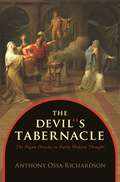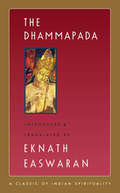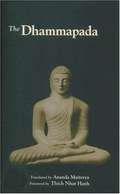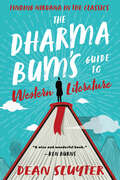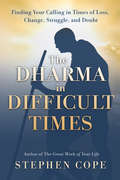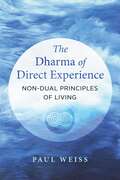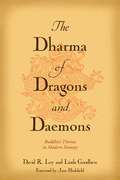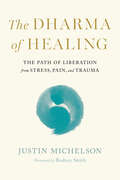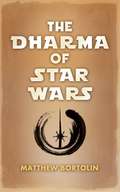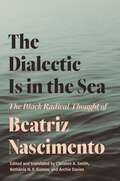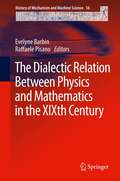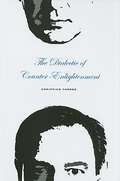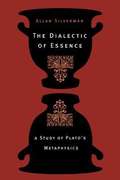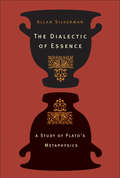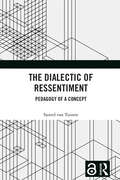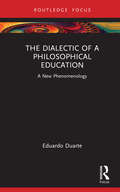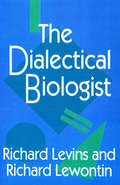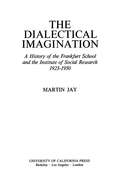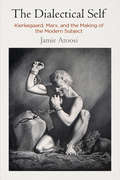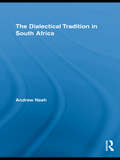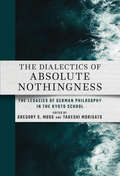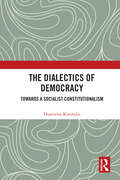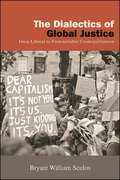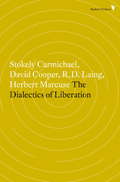- Table View
- List View
The Devil's Tabernacle: The Pagan Oracles in Early Modern Thought
by Anthony Ossa-RichardsonThe Devil's Tabernacle is the first book to examine in depth the intellectual and cultural impact of the oracles of pagan antiquity on modern European thought. Anthony Ossa-Richardson shows how the study of the oracles influenced, and was influenced by, some of the most significant developments in early modernity, such as the Christian humanist recovery of ancient religion, confessional polemics, Deist and libertine challenges to religion, antiquarianism and early archaeology, Romantic historiography, and spiritualism. Ossa-Richardson examines the different views of the oracles since the Renaissance--that they were the work of the devil, or natural causes, or the fraud of priests, or finally an organic element of ancient Greek society. The range of discussion on the subject, as he demonstrates, is considerably more complex than has been realized before: hundreds of scholars, theologians, and critics commented on the oracles, drawing on a huge variety of intellectual contexts to frame their beliefs. In a central chapter, Ossa-Richardson interrogates the landmark dispute on the oracles between Bernard de Fontenelle and Jean-François Baltus, challenging Whiggish assumptions about the mechanics of debate on the cusp of the Enlightenment. With erudition and an eye for detail, he argues that, on both sides of the controversy, to speak of the ancient oracles in early modernity was to speak of one's own historical identity as a Christian.
The Dhammapada
by Eknath EaswaranDhammapada means "the path of dharma," the path of truth, harmony, and righteousness. Eknath Easwaran's translation of this essential Buddhist text, based on the oldest version, consists of 423 short verses gathered by the Buddha's direct disciples after his death and organized by theme: anger, thought, joy, pleasure, and others. The Buddha's timeless teachings take the form of vivid metaphors from everyday life and are well served by Easwaran's lucid translation. An authoritative introduction and chapter notes offer helpful context for modern readers.
The Dhammapada: The Path of Truth
by Balangoda Ananda MaitreyaThe Dhammapada is often characterized as the most representative example of the teachings of the Buddha. It provides, beautifully and simply, a key to the fundamentals of early Buddhist philosophy and has been translated from the original Pali into more languages than any other Buddhist text. <P><P>The message of the Dhammapada is relevant to our time. It points to a way of life and attitudes that emphasize harmony and oneness with all living beings. Its message of right action is timeless as well as timely, reflecting the spirit of the Buddha's teaching method, and speaks to the perfectibility of humankind and to the scientific impeccability of the law of cause and effect. <P><P>This version of the Dhammapada has been derived from the translation by one of the most highly regarded teachers in the Theravada Buddhist world, The Most Venerable Aggamahapandita Balangoda Ananda Maitreya, Mahanayaka Thera.
The Dharma Bum’s Guide to Western Literature: Finding Nirvana in the Classics
by Dean SluyterHOW THE LITERATURE WE LOVE CONVEYS THE AWAKENING WE SEEK Suppose we could read Hemingway as haiku . . . learn mindfulness from Virginia Woolf and liberation from Frederick Douglass . . . see Dickinson and Whitman as buddhas of poetry, and Huck Finn and Gatsby as seekers of the infinite . . . discover enlightenment teachings in Macbeth, The Catcher in the Rye, Moby-Dick, and The Bluest Eye. Some of us were lucky enough to have one passionate, funny, inspiring English teacher who helped us fall in love with books. Add a lifetime of teaching Dharma — authentic, traditional approaches to meditation and awakening — and you get award-winning author Dean Sluyter. With droll humor and irreverent wisdom, he unpacks the Dharma of more than twenty major writers, from William Blake to Dr. Seuss, inspiring readers to deepen their own spiritual life and see literature in a fresh, new way: as a path of awakening.
The Dharma in Difficult Times: Finding Your Calling in Times of Loss, Change, Struggle, and Doubt
by Stephen CopeThe best-selling author of The Great Work of Your Life shows us the way through our darkest times to our truest calling.How do we make sense of our lives when our world seems to be falling apart? In this beautifully written guide, scholar and teacher Stephen Cope shows that crises don&’t have to derail us from our purpose—they can actually help us to find our purpose and step forward as our best selves. The Dharma in Difficult Times extends the message of Cope&’s best-loved book, The Great Work of Your Life, which gave readers a roadmap for the journey to their true calling. As in Great Work, Cope here takes the ancient yogic text the Bhagavad Gita—the epic narrative of the warrior Arjuna&’s odyssey of self-discovery—as a model for the reader&’s journey. Then he builds on that foundation using the stories and teachings of famous figures, as well as stories of ordinary people and his own rich personal experience. Along the way, we find striking examples for finding meaning and purpose in our lives: • Gandhi shows how to tap our spiritual resources and listen for our inner voice • Sojourner Truth and Henry David Thoreau inspire us to seek out the unmistakable signs of dharma in the midst of chaos • Marian Anderson and Ruby Sales shed light on dharma&’s mystic power and how we learn to trust in it • And more In the spirit of Pema Chödrön&’s When Things Fall Apart, this book is required reading when you find yourself forging a path through crisis—or seeking a way through your darkest times to your truest self.
The Dharma of Direct Experience: Non-Dual Principles of Living
by Paul Weiss• Examines the direct perception of non-dual reality and shows its implications for navigating ordinary reality in an open, compassionate, and ever-maturing way• Shares the author&’s most significant awakening experiences and explores their psycho-emotional and psychospiritual foundations• Offers practical teachings for spiritual understanding, emotional development, and the cultivation of compassionExploring the direct perception of non-dual, &“non-ordinary&” reality, Paul Weiss shares guidance for navigating ordinary reality in an open, compassionate, and ever-maturing way. He affirms our shared human potential for the &“direct experience&” of reality--unmediated by our more relativistic mental faculties--and reveals this experience as an essential dimension of our conscious capacity for growth. He shares his most significant awakening experiences and the circumstances leading up to them, exploring the personal and transpersonal dimensions of the experiences and their psycho-emotional and psycho- spiritual foundations. He points to such experiences as part of our ongoing integration as human beings and the essential path of practice that supports our availability to them. Interweaving perspectives from psychology and neuroscience with important lessons from spiritual traditions around the world, Weiss explores how to live a life of integrity, reciprocity, and openness to reality, offering practical teachings for spiritual understanding, emotional development, and the cultivation of compassion, viewed by ancient Buddhist sages as the true meaning of existence. He addresses such human qualities as vulnerability, empathy, reciprocity, openness, and intimacy and shows how they express and participate in deeper conscious truths. The author also examines practical wisdom teachings within both Buddhist and Christian paths to realization.Combining engaged mysticism with transcendent humanism, along with thought- provoking poetry, Weiss offers a living vision of a non-dual way of experiencing the world, a path that supports our functional, emotional, and spiritual maturity.
The Dharma of Dragons and Daemons: Buddhist Themes in Modern Fantasy
by David R. Loy Linda Goodhew Jane HirshfieldIn order to live, we need air, water, food, shelter...and stories. This book is about Buddhist stories: not about stories to be found in Buddhism, but about the "Buddhism" to be found in some of the classics of contemporary fantasy including the works of J. R. R. Tolkien, Hayao Miyazaki, Michael Ende, Philip Pullman, and Ursula K. LeGuin.Many books are called groundbreaking, but this one is truly unique and sure to appeal to anyone with an interest in fantasy literature. It employs a Buddhist perspective to appreciate some of the major works of modern fantasy--and uses modern fantasy fiction to elucidate Buddhist teachings. In the tradition of David Loy's cutting-edge presentation of a Buddhist social theory in The Great Awakening, this pioneering work of Buddhist literary analysis, renown scholar David Loy and Linda Goodhew offer ways of reading modern fantasy-genre fiction that illuminate both the stories themselves, and the universal qualities of Buddhist teachings. Authors examined include J.R.R. Tolkien, Philip Pullman (of The Amber Spyglass trilogy, from whose works the word "daemon" is borrowed in the title), Ursula K. LeGuin, and the anime movie Princess Mononoke.
The Dharma of Healing: The Path of Liberation from Stress, Pain, and Trauma
by Justin Michelson"...Both a refuge and a roadmap, this book illuminates the boundless love and wisdom that lies within each of us, waiting to be uncovered and shared."–Tara Brach, author of Radical Compassion A handbook for spiritual freedom in an age of global crisis.The world is in turmoil because of its trauma. Our unhealed psychological wounds block our innate expressions of wisdom and compassion, setting the stage for ongoing conflict, division, and stress. Our fate, both individual and collective, lies in our capacity to heal emotionally and spiritually—and for that, we need to remember the power, resilience, and essential goodness of our own hearts. This book is for anyone that wants to: Discover the root cause of their suffering and the key principles to heal it.Transform challenging emotions and deepen spiritual insight with simple and intuitive techniques.Integrate these skills and understandings back into relationships and work in the world.In The Dharma of Healing, Justin Michelson walks readers through an ingeniously simple approach to healing and spiritual insight using a unique and powerful form of self-compassion rooted in Buddhist wisdom. With 39 guided meditations that systematically lead readers through a comprehensive inner journey, Michelson provides everything that&’s needed to confidently walk the path of healing ourselves. Synergizing modern styles of emotional work with timeless spiritual practices, he shows how we can recognize painful emotions, transform difficult feelings into positive forces in our lives, and find our spiritual home within. The Dharma of Healing is an essential guide for anyone who longs for inner peace in a world that is so rarely peaceful.
The Dharma of Star Wars
by Matthew BortolinPlumbing the Star Wars universe for spiritual lessons is as old as the first Star Wars film released in 1977. The author of this book looks through a specifically Buddhist lens, using Buddhist philosophy to interpret the characters, plots, and dialogue.
The Dharma of The Princess Bride: What the Coolest Fairy Tale of Our Time Can Teach Us About Buddhism and Relationships
by Ethan NichternAn engagingly contemporary approach to Buddhism—through the lens of an iconic film and its memorable charactersHumorous yet spiritually rigorous in the tradition of Zen and the Art of Motorcycle Maintenance and The Tao of Pooh, drawing from pop culture and from personal experience, The Dharma of “The Princess Bride” teaches us how to understand and navigate our most important personal relationships from a twenty-first-century Buddhist perspective.Friendship. Romance. Family. These are the three areas Ethan Nichtern delves into, taking as departure points the indelible characters from Rob Reiner’s perennially popular film—Westley, Fezzik, Vizzini, Count Rugen, Princess Buttercup, and others—as he also draws lessons from his own life and his work as a meditation teacher. Nichtern devotes the first section of the book to exploring the dynamics of friendship. Why do people become friends? What can we learn from the sufferings of Inigo Montoya and Fezzik? Next, he leads us through all the phases of illusion and disillusion we encounter in our romantic pursuits, providing a healthy dose of lightheartedness along the way by sharing his own Princess Buttercup List and the vicissitudes of his dating life as he ponders how we idealize and objectify romantic love. Finally, Nichtern draws upon the demands of his own family history and the film’s character the Grandson to explore the dynamics of “the last frontier of awakening,” a reference to his teacher Chogyam Trungpa’s claim that it’s possible to be enlightened everywhere except around your family. With The Dharma of “The Princess Bride” in hand, we can set out on the path to contemporary Buddhist enlightenment with the most important relationships in our lives.
The Dialectic Is in the Sea: The Black Radical Thought of Beatriz Nascimento
by Beatriz NascimentoCollected writings by one of the most influential Black Brazilian intellectuals of the twentieth centuryBeatriz Nascimento (1942–1995) was a poet, historian, artist, and political leader in Brazil&’s Black movement, an innovative and creative thinker whose work offers a radical reimagining of gender, space, politics, and spirituality around the Atlantic and across the Black diaspora. Her powerful voice still resonates today, reflecting a deep commitment to political organizing, revisionist historiography, and the lived experience of Black women. The Dialectic Is in the Sea is the first English-language collection of writings by this vitally important figure in the global tradition of Black radical thought.The Dialectic Is in the Sea traces the development of Nascimento&’s thought across the decades of her activism and writing, covering topics such as the Black woman, race and Brazilian society, Black freedom, and Black aesthetics and spirituality. Incisive introductory and analytical essays provide key insights into the political and historical context of Nascimento&’s work. This engaging collection includes an essay by Bethânia Gomes, Nascimento&’s only daughter, who shares illuminating and uniquely personal insights into her mother&’s life and career.
The Dialectic Relation Between Physics and Mathematics in the XIXth Century
by Raffaele Pisano Evelyne BarbinThe aim of this book is to analyse historical problems related to the use of mathematics in physics as well as to the use of physics in mathematics and to investigate Mathematical Physics as precisely the new discipline which is concerned with this dialectical link itself. So the main question is: When and why did the tension between mathematics and physics, explicitly practised at least since Galileo, evolve into such a new scientific theory? The authors explain the various ways in which this science allowed an advanced mathematical modelling in physics on the one hand, and the invention of new mathematical ideas on the other hand. Of course this problem is related to the links between institutions, universities, schools for engineers, and industries, and so it has social implications as well. The link by which physical ideas had influenced the world of mathematics was not new in the 19th century, but it came to a kind of maturity at that time. Recently, much historical research has been done into mathematics and physics and their relation in this period. The purpose of the Symposium and this book is to gather and re-evaluate the current thinking on this subject. It brings together contributions from leading experts in the field, and gives much-needed insight in the subject of mathematical physics from a historical point of view.
The Dialectic of Counter-Enlightenment
by Christian ThorneIn this wide-ranging, ambitious, and engaging study, Christian Thorne confronts the history and enduring legacy of anti-foundationalist thought. Anti-foundationalism—the skeptical line of thought that contends our beliefs cannot be authoritatively grounded and that most of what passes for knowledge is a sham—has become one of the dominant positions in contemporary criticism. Thorne argues that despite its ascendance, anti-foundationalism is wrong. In The Dialectic of Counter-Enlightenment, he uses deft readings of a range of texts to offer new perspectives on the ongoing clash between philosophy and comprehensive doubt.
The Dialectic of Essence: A Study of Plato's Metaphysics
by Allan SilvermanThe Dialectic of Essence offers a systematic new account of Plato's metaphysics. Allan Silverman argues that the best way to make sense of the metaphysics as a whole is to examine carefully what Plato says about ousia (essence) from the Meno through the middle period dialogues, the Phaedo and the Republic, and into several late dialogues including the Parmenides, the Sophist, the Philebus, and the Timaeus. This book focuses on three fundamental facets of the metaphysics: the theory of Forms; the nature of particulars; and Plato's understanding of the nature of metaphysical inquiry. Silverman seeks to show how Plato conceives of "Being" as a unique way in which an essence is related to a Form. Conversely, partaking ("having") is the way in which a material particular is related to its properties: Particulars, thus, in an important sense lack essence. Additionally, the author closely analyzes Plato's idea that the relation between Forms and particulars is mediated by form-copies. Even when some late dialogues provide a richer account of particulars, Silverman maintains that particulars are still denied essence. Indeed, with the Timaeus's introduction of the receptacle, there are no particulars of the traditional variety. This book cogently demonstrates that when we understand that Plato's concern with essence lies at the root of his metaphysics, we are better equipped to find our way through the labyrinth of his dialogues and to better appreciate how they form a coherent theory.
The Dialectic of Essence: A Study of Plato's Metaphysics
by Allan SilvermanThe Dialectic of Essence offers a systematic new account of Plato's metaphysics. Allan Silverman argues that the best way to make sense of the metaphysics as a whole is to examine carefully what Plato says about ousia (essence) from the Meno through the middle period dialogues, the Phaedo and the Republic, and into several late dialogues including the Parmenides, the Sophist, the Philebus, and the Timaeus. This book focuses on three fundamental facets of the metaphysics: the theory of Forms; the nature of particulars; and Plato's understanding of the nature of metaphysical inquiry. Silverman seeks to show how Plato conceives of "Being" as a unique way in which an essence is related to a Form. Conversely, partaking ("having") is the way in which a material particular is related to its properties: Particulars, thus, in an important sense lack essence. Additionally, the author closely analyzes Plato's idea that the relation between Forms and particulars is mediated by form-copies. Even when some late dialogues provide a richer account of particulars, Silverman maintains that particulars are still denied essence. Indeed, with the Timaeus's introduction of the receptacle, there are no particulars of the traditional variety. This book cogently demonstrates that when we understand that Plato's concern with essence lies at the root of his metaphysics, we are better equipped to find our way through the labyrinth of his dialogues and to better appreciate how they form a coherent theory.
The Dialectic of Ressentiment: Pedagogy of a Concept
by Sjoerd van TuinenDrawing upon a wide variety of authors, approaches, and ideological contexts, this book offers a comprehensive and detailed critique of the distinct and polemical senses in which the concept of ressentiment (and its cognate 'resentment') is used today. It also proposes a new mode of addressing ressentiment in which critique and polemics no longer set the tone: care. Contemporary tendencies in political culture such as neoliberalism, nationalism, populism, identity politics, and large-scale conspiracy theories have led to the return of the concept of ressentiment in armchair political analysis. This book argues that, due to the tension between its enormous descriptive power and its mutually contradicting ideological performances, it is necessary to ‘redramatize’ the concept of ressentiment. By what right do we possess and use the concept of ressentiment, and what makes the phenomenon worth knowing? Inspired by Marxist political epistemology, affect theory, postcolonialism, and feminism, the book maps, delimits, and assesses four irreducible ways in which ressentiment can be articulated: the ways of the priest, the physician, the witness, and the diplomat. The first perspective is typically embodied by conservative (Scheler, Girard) and liberal (Smith, Rawls) political theory; the second, by Nietzsche, Deleuze and Foucault; whereas the standpoint of the witness is found in the writings of Améry, Fanon and Adorno; and the diplomat’s is the author’s own, albeit inspired by philosophers such as Ahmed, Stiegler, Stengers, and Sloterdijk. In producing a dialectical sequence between all four typical modes of enunciation, the book demonstrates how the first three reinterpretations of ressentiment are already implied in the theater set up in Nietzsche’s late polemical books, while the fourth proposes a line of flight out of it. The Dialectic of Ressentiment will be of interest to scholars and advanced students working in critical theory, social and political philosophy, cultural studies, sociology, history, literature, political science, anthropology, and Nietzsche scholarship. It will also appeal to anyone interested in the politics of anger, discourse ethics, trauma studies, and memory politics.
The Dialectic of a Philosophical Education: A New Phenomenology (Routledge International Studies in the Philosophy of Education)
by Eduardo DuarteThis book provides an account, both theoretical and phenomenological, of the education offered by philosophy. Specifically, it examines the three distinct moments that make up the practice of philosophical study: reading, writing, and discussion. By considering each moment in turn, the author explores how philosophical learning creates opportunities for what Hannah Arendt described as “the gift of thinking poetically” and suggests that the dynamic and nonlinear relationship between these moments is what constitutes the dialectic of a philosophical education.Grounded in years of practice and offering scholarly commentary throughout, this shortform book will appeal to students and philosophers of education, as well as those with interests in teaching and learning more broadly.
The Dialectical Biologist
by Richard Levins Richard LewontinScientists act within a social context and from a philosophical perspective that is inherently political. Whether they realize it or not, scientists always choose sides. The Dialectical Biologist explores this political nature of scientific inquiry, advancing its argument within the framework of Marxist dialectic. These essays stress the concepts of continual change and codetermination between organism and environment, part and whole, structure and process, science and politics. Throughout, this book questions our accepted definitions and biases, showing the self-reflective nature of scientific activity within society.
The Dialectical Imagination
by Martin JayHerbert Marcuse, Erich Fromm, Max Horkheimer, Franz Neumann, Theodor Adorno, Leo Lowenthal--the impact of the Frankfurt School on the sociological, political, and cultural thought of the twentieth century has been profound. The Dialectical Imagination is a major history of this monumental cultural and intellectual enterprise during its early years in Germany and in the United States. Martin Jay has provided a substantial new preface for this edition, in which he reflects on the continuing relevance of the work of the Frankfurt School.
The Dialectical Self: Kierkegaard, Marx, and the Making of the Modern Subject
by Jamie AroosiAlthough Karl Marx and Søren Kierkegaard are both major figures in nineteenth-century Western thought, they are rarely considered in the same conversation. Marx is the great radical economic theorist, the prophet of communist revolution who famously claimed religion was the "opiate of the masses." Kierkegaard is the renowned defender of Christian piety, a forerunner of existentialism, and a critic of mass politics who challenged us to become "the single individual." But by drawing out important themes bequeathed them by their shared predecessor G. W. F. Hegel, Jamie Aroosi shows how they were engaged in parallel projects of making sense of the modern, "dialectical" self, as it realizes itself through a process of social, economic, political, and religious emancipation.In The Dialectical Self, Aroosi illustrates that what is traditionally viewed as opposition is actually a complementary one-sidedness, born of the fact that Marx and Kierkegaard differently imagined the impediments to the self's appropriation of freedom. Specifically, Kierkegaard's concern with the psychological and spiritual nature of the self reflected his belief that the primary impediments to freedom reside in subjectivity, such as in our willing conformity to social norms. Conversely, Marx's concern with the sociopolitical nature of the self reflected his belief that the primary impediments to freedom reside in the objective world, such as in the exploitation of the economic system. However, according to Aroosi, each thinker represents one half of a larger picture of freedom and selfhood, because the subjective and objective impediments to freedom serve to reinforce one another.By synthesizing the writing of these two diametrically opposed figures, Aroosi demonstrates the importance of envisioning emancipation as a subjective, psychological, and spiritual process as well as an objective, sociopolitical, and economic one. The Dialectical Self attests to the importance and continued relevance of Marx and Kierkegaard for the modern imagination.
The Dialectical Tradition in South Africa
by Andrew NashThis book brings into view the most enduring and distinctive philosophical current in South African history—one often obscured or patronized as Afrikaner liberalism. It traces this current of thought from nineteenth-century disputes over Dutch liberal theology through Stellenbosch existentialism to the prison writings of Breyten Breytenbach, and examines related themes in the work of Olive Schreiner, M. K. Gandhi, and Richard Turner. At the core of this tradition is a defence of free speech in its classical sense, as a virtue necessary for a good society, rather than in its modern liberal sense as an individual right. Out of this defence of free speech, conducted in the face of charges of heresy, treason, and immorality, a range of philosophical conceptions developed—of the self constituted in dialogue with others, of freedom as transcendence of the given, and of a dialectical movement of consciousness as it is educated through debate and action. This study shows the Socratic commitment to "following the argument where it leads," sustained and developed in the storm and stress of a peculiar modernity.
The Dialectics of Absolute Nothingness: The Legacies of German Philosophy in the Kyoto School
by Gregory S. Moss Takeshi MorisatoThe Dialectics of Absolute Nothingness investigates the appropriations, critiques, and innovative interpretations of German philosophy by the Kyoto School, showing how central concepts of German philosophical traditions found a place within non-Western frameworks such as Zen and Pure Land Buddhism, thereby transcending the original Western context.Kyoto School philosophers critically engaged with their own tradition and grappled with classical German philosophy from Kant to German Idealism and from Neo-Kantianism to German phenomenology. Far from mimicking the Western tradition, Nishida, Tanabe, Nishitani and other Japanese philosophers overcame their sense of alienation from European philosophy by making its concepts their own and advancing their ideas as a hybrid of European and Japanese philosophy through which they developed their own world historical perspective.Showcasing the ways that Kyoto School philosophers internalized German philosophy and generated their own original perspectives, The Dialectics of Absolute Nothingness demonstrates the Kyoto School's potential for culturally diversifying the study of German philosophy and paves the way for the comprehensive study of Asian philosophy in European and global contexts.
The Dialectics of Democracy: Towards a Socialist Constitutionalism
by Dimitrios KivotidisThis book examines how the democratic form and the struggle for democracy reflects, influences and shapes the struggle for social emancipation.In the context of increased exploitation, rising inequality, and intensified struggle for social justice in the aftermath of the economic crisis, the channelling of populism through liberal democratic institutions has had contradictory effects: giving rise to both Corbyn and Brexit, Sanders and Trump, Syriza and the Golden Dawn, to name but a few. How can we make sense of these developments? In response, this book approaches the idea of democracy from a socialist constitutionalist standpoint and explores institutional forms and principles that challenge and aim at the transformation of the extant social order. This process involves the challenging of well-established ideas of the liberal viewpoint, as well as an unwavering focus on the issue of class rule which enables the highlighting of limitations of -not only mainstream but also heterodox- contemporary approaches to constitutionalism and democracy. Ultimately, democracy is conceived as a process of struggle for creating the conditions, material as well as intellectual, for its actualisation.This significant work of legal and political theory will be of considerable interest to those working in these areas to make sense of contemporary developments, and to further the causes of social justice and social emancipation.
The Dialectics of Global Justice: From Liberal to Postcapitalist Cosmopolitanism (SUNY series in New Political Science)
by Bryant William SculosThe Dialectics of Global Justice uses a novel application of negative dialectical interpretation to offer an immanent and ethical critique of prominent theories of global justice (i.e., cosmopolitanism), including how these theories manifest in political movements and policy agendas. Drawing on the work of Theodor Adorno and Erich Fromm especially, author Bryant William Sculos exposes the contradictory relationship between cosmopolitanism and core elements of capitalism, particularly the domineering "capitalistic mentality" (re)produced by and through capitalism, leading to the conclusion that cosmopolitanism, on its own terms, demands an alternative, postcapitalistic political basis in order to make robust progress toward global justice. While offering this critique, Sculos also implicitly challenges the increasingly common view that cosmopolitanism today is inherently imperialistic and out of touch with the global resurgence of nationalism and anti-cosmopolitan sentiment.
The Dialectics of Liberation
by David CooperThe Congress of the Dialectics of Liberation, held in London in 1967, was a unique expression of the politics of modern dissent, in which existential psychiatrists, Marxist intellectuals, anarchists, and political leaders met to discuss the key social issues of the following decade. Edited by David Cooper, this volume compiles speeches by Stokely Carmichael, Herbert Marcuse, R. D. Laing, Paul Sweezy, and others. The collection explores the roots of violence in society. Against the backdrop of rising student frustrations, racism, class inequality, and environmental degradation, this conference aimed to create genuine revolutionary momentum by fusing ideology and action on the levels of the individual and of mass society. These speeches clearly indicate the rise of a new, forceful, and (to some) ominous style of political activity.From the Trade Paperback edition.
